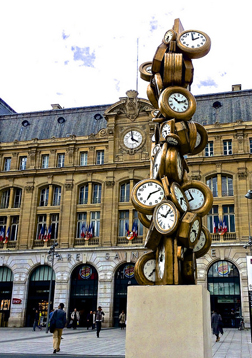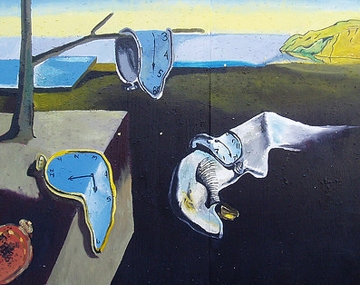 ‘When I play Candy Land with my five-year-old, time creeps,” she says. “A game lasts only 10 minutes, but it feels like two hours to me.”
‘When I play Candy Land with my five-year-old, time creeps,” she says. “A game lasts only 10 minutes, but it feels like two hours to me.”
My friend is describing her experience of subjective time. The clock in her phone steadily marks the minutes, no matter what she does. Yet while she plays Candy Land— a board game that requires no reading, minimal counting skills, and is popular with young children—her brain measures time in a decidedly Dali-esque way. It perceives each second as stretching and warping around the experience of the game. Compared to the experience of time during the game, she finds time compresses and races before and after playing.
“My daughter finds the 10 minutes flash by like lightening.”
My friend would appreciate Einstein’s joke, “Put your hand on a hot stove for a minute, and it seems like an hour,” he said. “Sit with a pretty girl for an hour, and it seems like a minute. That’s relativity.”
An entire sub-field of psychology exists to investigate why time seems to speed up or creep along depending on what we’re doing. No definitive insights have emerged, but some influences have been identified.
Ticking off the seconds of subjective time is, psychologists believe, an internal, biological clock. The scientists believe it pulses according to each person’s own rate of cell function deep within the brain, but is tracked, measured and influenced by neural networks across the brain, as well as by our senses, emotions, health and environment.
In contrast, modern real-time atomic clocks that measure the vibrations of atoms are mere child’s play.
And, lo, the researchers find that boredom and motivation affect how we perceive time. When we’re bored, our brains have more space to ponder the passage of each subjective second—“Are we there yet?”
Conversely, when we learn something new, meet new people, or start a new job, newness preoccupies our noggins. Distracted, the brain’s grip on time slips, and strange things start to happen. If we’re amazed and engaged, present-time stretches. If we’re anxious or stressed, time sweeps on too quickly. If we’re having fun, it’s over too soon. If we’re absorbed, time becomes irrelevant.
Fear makes time crawl. Psychologists tested this by having people stare at a special chronometer while free-falling 50 metres into a net. The researchers concluded we recall such times as lasting longer than they really did because life-threatening experiences like these make us pay attention to the moment and indelibly inscribe memories of them in our brains.
Other researchers tested student’s perceptions of time during scary movies, sad movies, weather forecasts and stock-market updates. They found that fear-caused states of arousal accompanied students’ beliefs that the scary parts of movies lasted longer than they really did. As well, the students showed all the physical responses to threats: dilated pupils, increased heart rates and blood pressure, contracted muscle, and so on.
Neither sad movies nor weather forecasts triggered altered students’ perceptions of time. Scarier weather reports may solve that—forecasts for a foot of snow make my heart pound, and any day spent shoveling seems to last forever.
Feeling powerful and in control may slow perceived time. Likewise, stress influences time perception, with acute levels—perhaps caused by a sense of powerless—kicking it into high gear.
Age plays a part, too. A one-month vacation equals 1/60th of a six-year-old’s lifetime, but only 1/600th of a 50-year-old’s life, which, presumably, has experienced 599 other months and many memorable vacations to lessen the emotional impact of this one. Furthermore, at age five, every day brings new things to learn and experience with minds and senses wide open. At age 50, routine is the order of the day, and autopilot rules.
We also tend remember the memorable over the routine, but as we age our brains become less adept at creating and accessing any memories.
All of this may cause subjective time to speed up as the years pass.
To slow it down, we may need to seek out specific time-suppressing activities—new experiences and learning new things.
…Or playing games we really, really dislike.
—30—
A version of this editorial appears in the November 01, 2015, Victoria Times Colonist






